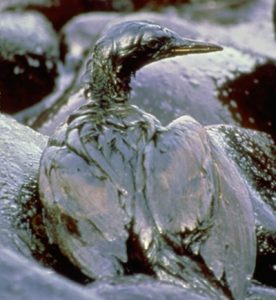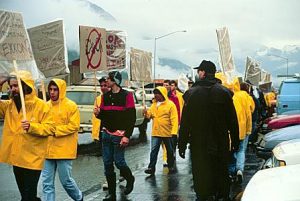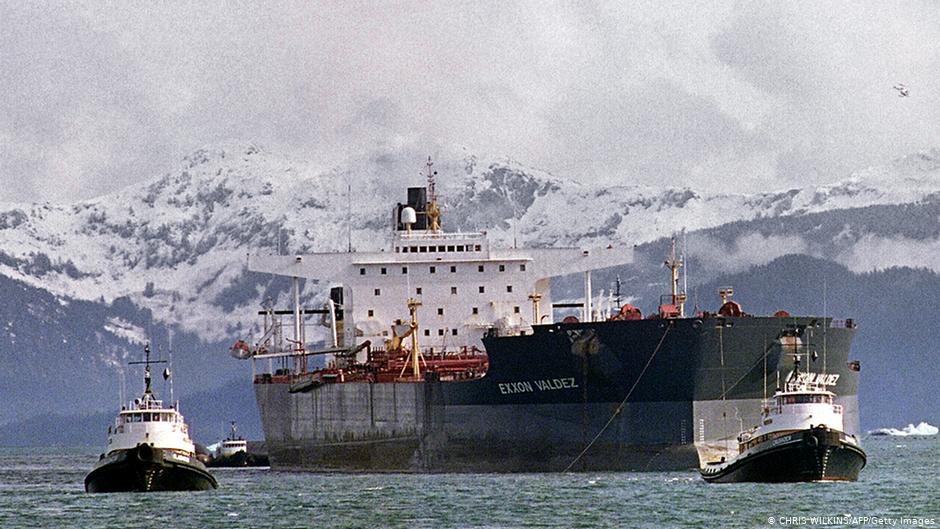“It takes great strength to recognize the reflection in the mirror and dig deep within yourself. Don’t create and image that isn’t there. Act on what you see. The environment is a reflection of who we are. We can’t ignore the reflection we see. We have to live with it––today, tomorrow and forever.”
– Dolly Reft, Kodiak native, during Alaska Oil Spill Commission hearing.
The impact that the Exxon Valdez disaster had on the oil industry and environmentalism cannot be understated. For millions of Americans, the events that occurred in the Prince William Sound brought awareness and visibility to the perils of oil industry and its maritime transportation systems. As historian Stephen Haycox notes, the Exxon Valdez spill has “entered American cultural consciousness as an iconic cataclysm” (Haycox, 235). In the weeks following the disaster, the American cultural consciousness––which had often associated Alaska with unspoiled wilderness and scenic natural beauty––was deeply influence by images that depicted birds, otters and other wild animals suffocating in oil slicks. For instance, a week after the disaster the front page of the New York Times featured a picture of a bird that was soaked in oil and was awaiting treatment by a rescue team (. According to historian Kathryn Morse, such images of oiled animals became a symbol of the disaster and struck a chord among the environmentalist movement that emerged during the seventies and eighties––an movement that was characterized by an increased desired among white middle and upper-class Americans for “recreational and residential contact with beautiful landscapes and seascapes” (Morse, 128). For these types of citizens, the Exxon Valdez oil spill represented a direct attack on the unspoiled American wilderness.


Oil Pollution Act of 1990:
The cataclysm that resulted from Exxon Valdez is evidenced by the passage of the Oil Pollution Act of 1990 (OPA), a law passed only 6 months after the oil spill that ended a 14-year long congressional deadlock on how to streamline and strengthen federal oil pollution laws. The passage of these law reflected the increased public demand for governmental oversight over the oil industry, which the OPA attempted to do by imposing tougher penalties and liability for corporations that spilled oil. Furthermore, the new law allocated more resources and federal oversight over the clean-up efforts by placing an oil tax and raising over $10 billion funds to buy and store the necessary equipment. In addition, the new law imposed new requirements for vessel construction and crew manning. Many of the OPA’s regulations were in direct response to failed safety protocols that had occurred in during the Exxon Valdez’s grounding and clean-up efforts. Many policy makers saw the OPA as a major success and as a law that fundamentally checked the oil industry. For instance, Richard Hobbie, the chairman of the Water Quality Agency, claimed that the OPA was a “fundamentally change in how the US [government] viewed oil spills” (Birkland and Lawrence, 19).

The Deepwater Horizon 2010: The Unlearned Lessons
In April of 2010, an explosion at the Deepwater Horizon drilling rig in the Gulf of Mexico, led to the discharge of 210 million gallons of crude oil––the worst offshore oil spill in the U.S. history. Despite the fact that the Deepwater Horizon disaster did not involve an oil tanker, the similarities between the two disaster are striking. According to the Deepwater Commission Report, the industrial accident was the result of failed governmental oversight and a corporate risk management system that was inadequate. Furthermore, the Deepwater Horizon spillage was exacerbated by a failed clean up response effort that had prevented the early containment of the spill. While the explosion of the Deepwater Horizon was perhaps not as negligent as the grounding of the Exxon tanker, the similarities between the two disasters angered for a lot of people. Why had the OPA and other regulations that had been in place in the aftermath of Exxon Valdez not worked? Why was the government and BP unprepared? Who had allowed the BP to drill at such high pressures without the proper protocols? In the weeks and months following the disaster, as images of dead sea turtles and the Gulf of Mexico clean up made the newspapers’ front covers, Americans and the policy makers vowed that they had finally learned their lesson. They claimed that they were going to launch an investigation, just like they did in the aftermath of the Exxon Valdez, and this time they were going to get to the bottom of the issue. This type of disaster would not happen again, they said.
This year marks the tenth anniversary of the Deepwater Horizon and yet the promise to learn from the disaster appears to have fallen on deaf ears. Even though in the aftermath of the disaster the Obama administration passed a number of strict regulations that placed constraints on offshore drilling, a form of oil extraction that is susceptible to spills and hard to contain. Under the Trump administrations those regulations have been repealed down and corporations have been given new leeway. For instance, last year the Trump Administration passed a new law that reduced the frequency of safety testing for oil corporations and granted the industry more flexibility to self-regulate. These regulations are a blatant disregard of the lessons that both the Exxon Valdez and Deepwater Horizon disasters have taught us. When asked about the new Trump regulation Donald Bosh, the commissioner of the Deepwater Horizon Panel Investigation, said “I’m a little nervous about the times we’re in…the [oil] industry is trying to save and reduce costs and you have the government backing off on the safety responsibility” (Friedman). These words resonate as much today as they did fifty years ago in the wake of the Exxon Valdez––the lessons have not yet been learned.

